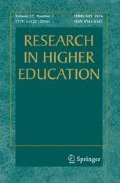Abstract
The present study examines the validity of the Eccles model of achievement behaviors (model of academic choice) for its predictive validity when the outcome (behavior) is student persistence in the postsecondary educational system to completion of at least the baccalaureate degree. Patterns of effects hypothesized by the theoretical model were only partially supported by the results forthcoming from the estimation of the model. Of the two constructs hypothesized to directly influence persistence—the value placed on college attendance and expectations for success in college—only value had significant influence. Two measures of goal orientations—business/financial and humanitarian/social—exerted indirect influence as hypothesized, but level of degree aspirations had as strong a direct influence on persistence as did value. Prior achievement had the strongest total effects of any of the variables in the model.
Similar content being viewed by others
References
Astin, A. (1982).Minorities in American Higher Education. San Francisco: Jossey-Bass.
Atkinson, J. W. (ed.) (1958).Motives in Fantasy, Action, and Society. Princeton, NJ: Van Nostrand.
Atkinson, J. W. (1964).An Introduction to Motivation. Princeton, NJ: Van Nostrand.
Crandall, V. C. (1969). Sex differences in expectancy of intellectual and academic reinforcement. In C. P. Smith (ed.),Achievement-Related Behaviors in Children (pp. 11–45). New York: Russell Sage.
Durkheim, E. (1951).Suicide J. Spaulding and G. Simpson, trans. Glencoe, IL: The Free Press.
Eccles, J., Adler, T. F., Futterman, R., Goff, S. B., Kaczala, C. M., Meece, J. L., and Midgley, C. (1983). Expectancies, values, and academic behaviors. In J. T. Spence (ed.),Achievement and Achievement Motives: Psychological and Sociological Approaches (pp. 78–146). San Francisco: W. H. Freeman and Co.
Meece, J. L., Parsons, J. E., Kaczala, C. M., Goff, S. B., and Futterman, R. (1982). Sex differences in math achievement: Toward a model of academic choice.Psychological Bulletin 91: 324–348.
Pascarella, E. T., and Chapman, D. (1983). A multiinstitutional, path analytic validation of Tinto's model of college withdrawal.American Educational Research Journal 20: 87–102.
Pascarella, E. T., and Terenzini, P. T. (1980). Predicting persistence and voluntary dropout decisions from a theoretical model.Journal of Higher Education 61: 60–75.
Pascarella, E. T., and Terenzini, P. T. (in press).Does College Make a Difference. San Francisco: Jossey-Bass.
Sobel, M. E. (1982). Asymptotic confidence intervals for indirect effects in structural equation models. In S. Leinhardt (ed.),Sociological Methodology 1982 (pp. 290–312). San Francisco: Jossey-Bass.
Spady, W. (1970). Dropouts from higher education: An interdisciplinary review and synthesis.Interchange 1: 64–85.
Spady, W. (1971). Dropouts from higher education: Toward an empirical model.Interchange 2: 38–62.
Tinto, V. (1975). Dropout from higher education: A theoretical synthesis of recent research.Review of Educational Research 45: 89–125.
Tinto, V. (1986). Theories of student departure revisited. In John C. Smart (ed.),Higher Education: Handbook of Theory and Research, Vol II (pp. 359–384). New York: Agathon Press.
Tinto, V. (1987).Leaving College. Chicago: University of Chicago Press.
Weiner, B. (1972).Theories of motivation: From Mechanism to Cognition.Chicago:Markham
Weiner, B. (1972).Achievement Motivation and Attribution Theory. Morristown, NJ: General Learning Press.
Wolfle, L. M., and Ethington, C. A. (1985). GEMINI: Program for analysis of structural equations with standard errors of indirect effects.Behavior Research Methods, Instruments and Computers 17: 581–584.
Author information
Authors and Affiliations
Rights and permissions
About this article
Cite this article
Ethington, C.A. A psychological model of student persistence. Res High Educ 31, 279–293 (1990). https://doi.org/10.1007/BF00992313
Received:
Issue Date:
DOI: https://doi.org/10.1007/BF00992313




